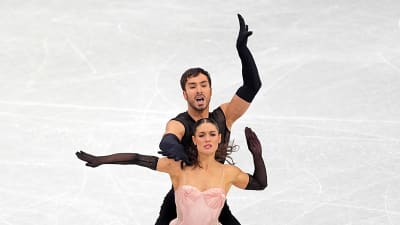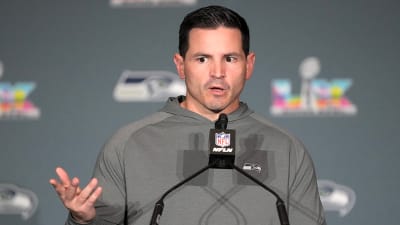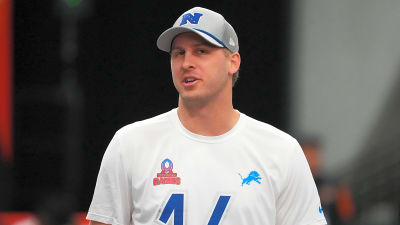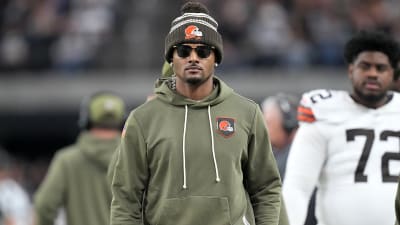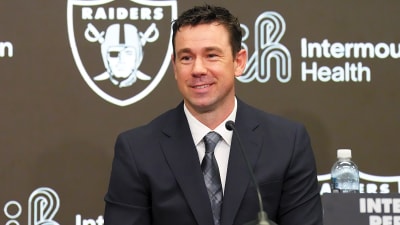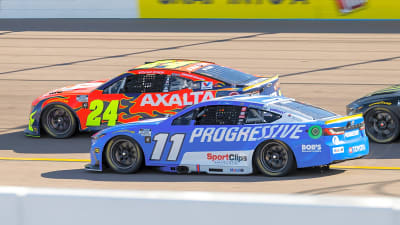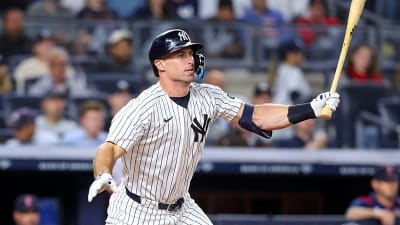The best and worst offseason moves of the 2015-16 MLB offseason.
1 of 30
Best: Braves trade Shelby Miller for franchise-changing package
Norm Hall / Getty Images
The Diamondbacks seem dead set on going all in this offseason, particularly adding former Cardinals starting pitcher Shelby Miller after luring ace Zack Greinke away from L.A. Miller pitched under current Diamondbacks Chief Baseball Officer Tony La Russa and Special Assistant Dave Duncan in St. Louis. There's no doubt Miller and his 3.27 ERA over the last three seasons help Arizona's pitching staff, but the team traded starting outfielder Ender Inciarte and elite prospects Aaron Blair and 2015 first overall draft choice Dansby Swanson to get him. Atlanta has nothing to play for in 2016 and potentially received a franchise-altering package for Miller.
Hannah Foslien / Getty Images
Detroit struck early in the offseason with a truly head-scratching move, signing Pelfrey to a two-year, $16 million contract after going 6-11 with a 4.26 ERA with the Twins in 2015. Pelfrey has a terrible 4.52 ERA for his career, and the Tigers have suggested he might not even pitch in the rotation.
3 of 30
Best: Mets sign Yoenis Cespedes to three-year deal
Rob Tringali / Getty Images
Cespedes' offense almost single-handedly led the Mets to the World Series after acquiring him last July, but they seemed resigned to him signing elsewhere. However, with an odd outfield market the Mets were able to re-sign Cespedes late in the offseason to a three-year, $75 million deal. The front office has been thrifty and focused on minimizing risk. Bringing Cespedes back on a short-term deal still in his prime years is a huge win.
Mark Cunningham / Getty Images
Tigers owner Mike Ilitch is one of the most generous owners in sports, if not one of the best overall, but this is yet another long-term deal that could come back to bite Detroit on top of past deals for Justin Verlander, Miguel Cabrera and Prince Fielder. Upton has been a relatively consistent hitter, but he's also averaged 164 strikeouts over the last three seasons and could have a difficult time living up to his $132.75 million contract. Even if Upton performs up to snuff in the short term, the team is lacking the starting pitching to make a big push.
Stephen Dunn / Getty Images
Rather than overpay for Zack Greinke early in the offseason, the Dodgers let their former co-ace walk and made their roster much deeper instead. It looked like they were set at second base with Chase Utley and Enrique Hernandez, but Kendrick fell right into their laps late in the offseason. With a limited second base market, the Dodgers brought back Kendrick on a two-year, $20 million contract. That value is nearly half of what comparable second baseman Daniel Murphy received from Washington, and it's hardly risky with Kendrick showing himself as one of the most consistent players in baseball since 2009.
6 of 30
Worst: Pirates trade Neil Walker for Jon Niese
Rob Foldy / Getty Images
The Pirates needed to address the loss of A.J. Burnett in the offseason, but it's hard to believe that this trade did it. They moved Pittsburgh native Walker to the Mets, thereby hurting their offense, and added a lefty with a history of shoulder problems who is coming off one of the worst seasons of his career with a 4.13 ERA and 5.8 K/9. Then again, the Pittsburgh coaching staff has worked magic with veteran pitchers in recent seasons, so maybe the Pirates see something the rest of the baseball industry doesn't see.
7 of 30
Best: Dodgers sign Kenta Maeda to eight-year, incentive-laden deal
Ezra Shaw / Getty Images
Maeda seemed like a big-ticket item this offseason, but he settled for an incentive-laden, eight-year contract that only guarantees him $25 million due to abnormalities in his physical. The Dodgers were focused on creating a deeper pitching staff this offseason, and this money is a drop in the bucket for the resource-rich organization. The result of this move can only be positive for L.A.
8 of 30
Worst: Rockies trade Corey Dickerson for a closer
Brian Bahr / Getty Images
The Rockies have one of the toughest situations in baseball playing in Colorado, where the ball carries like a rocket, but it's still unclear what they're trying to do. They sold low on Dickerson following an injury-plagued season, but he looked like a potential star in the making after posting a .931 OPS in 2014. In return, a team that lost 94 games in 2015 acquired a closer from Tampa Bay, albeit a very good one in Jake McGee. But why does a team that finished 24 games out of first place last season need to prioritize the back end of its bullpen?
9 of 30
Best: Royals re-sign Alex Gordon to four-year deal
Hannah Foslien / Getty Images
Gordon stated during the offseason that he really wanted to return to the Royals, and it apparently wasn't just lip service. The prospects of his return to small-market Kansas City seemed bleak, but he settled on a four-year, $72 million contract to remain with the defending World Series champs. The goal now will be hitting well enough to earn a statue next to George Brett.
Mike Stobe / Getty Images
The Giants are taking a gigantic risk in signing Cueto after elbow flare-ups and one of the worst seasons of his career. He was able to help the Royals in the playoffs but went 4-7 with a 4.76 ERA and 6.2 K/9 in 13 starts during the regular season. The Giants have guaranteed Cueto $130 million, and missing on this contract could be deadly with the team already struggling through Matt Cain's contract.
Rob Carr / Getty Images
The White Sox prioritized offense again this offseason, adding Frazier, Brett Lawrie and Dioner Navarro. Frazier has two years remaining before he hits free agency, and he's ascended over the last two seasons into an elite power hitter. Chicago's farm system did take a hit in acquiring Frazier, but the White Sox are smart to go for it during Chris Sale's prime.
12 of 30
Worst: Cardinals sign Mike Leake to five-year deal
Ezra Shaw / Getty Images
The Cardinals lost Lance Lynn to Tommy John surgery early in the offseason and failed to re-sign Jason Heyward. Their answer was signing Leake to a five-year deal. The move is a safe one given Leake's past durability, but he only slots in as a back-of-the-rotation starter with a 3.88 ERA over his career. The $80 million St. Louis fave him is quite a commitment for that level of production and won't get it done in the NL Central with the Cubs' improvements.
13 of 30
Best: Mariners sign Nori Aoki to one-year deal
Harry How / Getty Images
New Mariners GM Jerry Dipoto made plenty of under-the-radar moves in his first offseason with the team, and this one could be his best. He added the consistent Aoki on a one-year, $5.5 million contract to improve the team's on-base skills at the leadoff spot. Aoki has struggled to stay healthy over the last two seasons, but he's posted an OBP no worse than .349 during his four-year career in the States.
Denis Poroy / Getty Images
The Padres apparently wanted to cut salary this offseason, but it's hard to believe they couldn't do better than this for Gyorko. While he has been an overpaid disappointment in his brief MLB career, he's also just entering his prime seasons. Gyorko smashed lefties last season and hit 13 homers during the second half. Jay, on the other hand, fought through wrist issues for most of last season and can only take playing time away from the team's youngsters like Travis Jankowski.
Elsa / Getty Images
Murphy cashed in nicely on a three-year, $37.5 million deal after his career year and incredible playoff streak, but many analysts thought he'd get more money. He's hit at least .281 every season since 2011 and had a freakish 91 percent contact rate last season that could be a precursor to a batting title. This is the type of consistency an inconsistent Nationals offense could have sorely used last season.
16 of 30
Worst: Blue Jays re-signed Marco Estrada to a two-year deal
Tom Szczerbowski / Getty Images
Toronto bought low on Estrada last offseason by adding him for Adam Lind, but now the Jays are caught buying high. Estrada signed a two-year, $26 million contract this offseason after posting indicators that potentially show a blowup. He had a 3.13 ERA last season but also had a career-worst 6.5 K/9 and had trouble keeping the ball in the park. An ERA above 4.00 in 2016 wouldn't be surprising, and it would be tough to swallow for how much he'll be getting paid.
17 of 30
Best: Phillies trade Ken Giles for prospects
Drew Hallowell / Getty Images
The Phillies lost 99 games last season, and they're far from contention. Their most valuable asset this offseason happened to be their closer, and they received quite the package from Houston for him. Among the players Philadelphia received for Giles are former first overall draft pick Mark Appel and potential ace Vincent Velasquez. The Phils have no need for a quality closer on a losing team in the short term, so this move made too much sense.
Thearon W. Henderson / Getty Images
It was clear Boston needed to address its pitching this offseason, and it did so early by adding David Price and Craig Kimbrel. While Miley struggled at times last season with the Red Sox, it's difficult to see how moving him makes their rotation better. His ERA indicators suggested an ERA below 4.00, which could arguably make him their No. 2 starter behind Price. He's also been especially durable during his Major League career, throwing more than 190 innings in four consecutive seasons. Adding Carson Smith and Roenis Elias in the trade gives Boston more depth, but the team's young, thin rotation could miss Miley.
Joe Robbins / Getty Images
Chapman was traded to the Dodgers early in the offseason, but the trade was nixed when allegations of domestic abuse came to light. Those allegations didn't deter the Yankees from trading for Chapman later in the offseason after doing their due diligence, and it was later determined that Chapman wouldn't be charged. MLB could still penalize the closer, but the penalty seems unlikely to keep him out for significant time. Chapman has arguably been baseball's best reliever over the last four seasons, and the trade creates one of the best bullpens ever with Chapman, Andrew Miller and Dellin Betances.
Ed Zurga / Getty Images
Soria has returned to Kansas City on a three-year deal to be Wade Davis' setup man. He improves a strong bullpen, but three-year deals are risky for relievers, especially one with two Tommy John surgeries under his belt. The small-market Royals can't afford to miss on big contracts, and this one brings big risk.
21 of 30
Best: Mariners trade for Adam Lind
Jared Wickerham / Getty Images
Lind hasn't been the most durable player in baseball over the last few years, but his bat has been one of the most underrated. Since 2013, he has an .842 OPS as a well above-average offensive first baseman. The Mariners really didn't give up much to acquire Lind in what basically amounted to a salary dump by the Brewers, and it's a move that should add nice pop to the middle of Seattle's batting order.
Scott Cunningham / Getty Images
The Angels had one of the thinnest farm systems in baseball before trading two of their best prospects and starting shortstop Erick Aybar for Simmons. While Simmons is baseball's best defensive shortstop, it's unclear how much this move really helps the Angels. He really hasn't hit over the last two years and makes a thin lineup in Anaheim even more thin. Now the the Angels are lacking reinforcements if injuries strike and have minimal prospect talent to trade in order to improve.
23 of 30
Best: Phillies sign David Hernandez to one-year deal
Norm Hall / Getty Images
The Phillies had opportunities aplenty in their bullpen after trading Ken Giles, and often opportunities lead to favorable contracts for teams. That's the case in adding Hernandez, who could open the season as the team's closer. He had some struggles after returning from Tommy John surgery last season but was a tremendous reliever in 2011-12 with a 2.94 ERA and 11.4 K/9. If his command returns, the Phillies could have another elite closer on their hands.
Tom Szczerbowski / Getty Images
Toronto wanted to add starting pitching early in the offseason with David Price's loss pending, but it did so at the expense of its bullpen. The team traded breakout reliever Hendriks to Oakland for Jesse Chavez. Hendriks gained velocity last season and was absolutely dominant, while Chavez has been effective and versatile the last two seasons in Oakland but also benefited from a pitcher-friendly home ballpark. Hendriks' pinpoint control could have the makings of a closer, so the Jays might have sold low.
Darren McCollester / Getty Images
Zobrist got a huge four-year, $56 million contract at age 34, but he's a perfect fit in Chicago. He reunites with his former manager in Tampa Bay, Joe Maddon, and has plenty of playoff experience to guide the young Cubs. He's expected to play mostly at second base but could also get some time in the outfield if needed. The back end of the contract could hurt the Cubs, but it's not enough that the large-market team can't overcome it in return for the short-term rewards.
Jason Miller / Getty Images
The Giants seem awfully confident they can fix Samardzija after giving him $90 million. He was arguably baseball's worst starting pitcher in 2015, with a 4.96 ERA, and allowed the most hits, earned runs and home runs in the AL. They're hoping the 2014 version can return, but before that season Samardzija had a 4.34 ERA in 2013.
27 of 30
Best: Red Sox sign David Price to seven-year deal
Maddie Meyer / Getty Images
Boston's recent contracts haven't gone to plan, but this one has a different feel. Price will be getting $217 million to be the team's ace, but he's pitched almost all of his career in the AL East and has a career 1.95 ERA in 11 starts at Fenway Park. The big questions regarding Price surround his struggles in the playoffs, but Boston would just be happy to get there after weathering the 2015 season.
John Konstantaras / Getty Images
Playoff teams love relievers with closing experience, but this one has been in decline for quite some time. Broxton lost velocity recently and has posted an ERA above 4.00 in two of the past three seasons. The $7.5 million contract value won't kill the Cardinals, but it's difficult to see the upside.
Otto Greule Jr. / Getty Images
Before re-signing Chris Davis, the Orioles looked to have an offensive problem. They answered it by trading for Trumbo and can now avoid his poor defense by installing him at DH. He's disappointed over the last two seasons with a combined 36 home runs, but Trumbo averaged 32 home runs from 2011-13. Now playing his home games in one of baseball's best hitter's parks, Trumbo has the upside to reach the 30 home run mark again.
Mtichell Layton / Getty Images
The Nats demoted Storen to setup duty after acquiring Jonathan Papelbon last offseason. Papelbon was suspended before the season ended after fighting with Bryce Harper and seemed like a poor clubhouse fit. Yet, the Nationals probably found a limited market for Papelbon and moved Storen instead. Storen has 95 career saves and a 3.02 ERA, and is coming off his most dominant season with a 11.0 K/9. Washington added Yusmeiro Petit and Trevor Gott to its pen in the offseason, but it still looks like a weak point that was only made weaker with this move.
 +
+






























